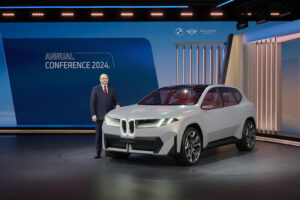
BMW: Capital and research costs to peak in 2024 for EV development
By onAnnouncements | Technology
BMW plans to spend more in research and development (R&D) than it ever has before in 2024 with a focus on electrification of its vehicle portfolio, in-car digital innovations, software stacks and automated driving, according to a press release.
“We are investing in the future of our company like never before,” Walter Mertl, BMW CFO, said in a press release. “Construction and modernisation of our plants and the planned expansion of our portfolio are progressing quickly this year. Our capital expenditure and R&D spending will reach new levels. We are expecting a capex ratio above 6% and an R&D ratio above 5%. Both metrics will then return to their usual strategic range.”
Capital spending also is set to peak in 2024 with extensive expansion at Plant Munich and the electrification of the MINI plant in Oxford.
Electric vehicles (EV) were about 15% or 375,000 of total sales for the company in 2023, according to company documents. The company said it has already increased its EV sales for the first months of 2024 and expect it to remain in the double digits through the rest of the year.
The company spent €7.8 billion on R&D in 2023, €600 million more than 2022, the documents say.
BMW plans to have more than 15 fully electric vehicles in its line-up by the end of 2024. It also announced its NEUE Klasse EV, which will be released in 2025 and is expected to help boost EV sales. The company is planning for half its deliveries to be all-electric by 2030.
“BEVs worldwide is not linear,” Oliver Zipse, BMW Board Chairman, said at the company’s annual conference, on March 21. “That was always clear to us. Development is volatile and market-specific, due to several factors. We remain as flexible as possible – that has been our strategy for years and we have reflected that efficiently in our architectures. We continue to prudently steer our BEV ramp-up in line with differentiated demand in global regions. And we have been successful.”
The company’s revenue for 2023 was €155.5 billion, a 9% increase from 2022, its documents say. The company earned €17.1 billion before tax, an increase of about €1.3 billion, or 8% from 2022.
BMW is not the only company focusing on EV production. Last week, Stellantis announced layoffs of about 400 U.S. workers as it shifts focus to EV production.
The layoffs will mainly impact the engineering, technology, and software departments at Chrysler’s Auburn Hills, Michigan headquarters, according to the Washington Post.
The Washington Post article says CEO Carlos Taveres has claimed the company would have to become more efficient to make the cost of EVs more affordable for the middle class.
Stellantis, which formed in the 2021 merger of PSA Peugeot and Fiat Chrysler, plans to launch 18 new electric vehicles this year, the article says. It says this would increase its global EV offerings by 60%.
Ford and General Motors also have made cuts in recent years as the companies transition to manufacturing EVs, according to the Washington Post.
Ford laid off 4,000 full-time and contract workers in 2022 and about 5,000 salaried workers took retirement and buyout offers at GM last spring.
Last week Fisker, which only produces EVs, announced it will pause production as it faces bankruptcy and delisting of its Class A stock, according to a company press release and Securities and Exchange Commission filings.
While many OEMs double down on EVs, Apple announced earlier this month it was terminating EV efforts and shifting more focus to AI. Bloomberg reported that the shift would cause some layoffs for the company.
IMAGES
Walter Mertl, BMW CFO, at BMW Group Annual Conference 2024 March 21, 2024. Photo courtesy of BMW.
